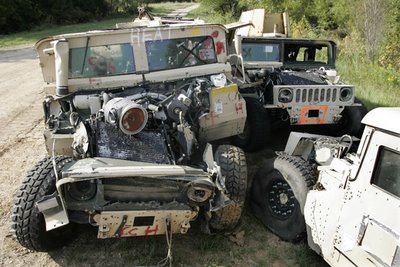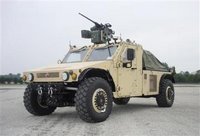On Wednesday, we'll see the report from the Iraq Study Group, which reportedly will propose a gradual withdrawal from the country.
Then we find out that Donald Rumsfeld -- apparently able to see the obvious, if only three years too late -- proposed major changes in the administration's Iraq policy shortly before resigning.
But whether Bush is in denial or not -- and the answer to that would appear to be at least a qualified "yes" -- any solution will have to take into account that some of our most reasonable-sounding plans have, simply, not worked. This time, in Afghanistan.
a joint report by the Pentagon and the State Department has found that the American-trained police force in Afghanistan is largely incapable of carrying out routine law enforcement work, and that managers of the $1.1 billion training program cannot say how many officers are actually on duty or where thousands of trucks and other equipment issued to police units have gone....
In its most significant finding, the report said that no effective field training program had been established in Afghanistan, at least in part because of a slow, ineffectual start and understaffing.
Now I realize that corruption, incompetence and inefficiency are something of a hallmark for this administration, but even so this is quite an indictment. Afghanistan has its own problems, but until recently a raging insurgency wasn't one of them. This isn't a case of the police not being trained to fight a guerrilla war; it's a case of the police not being trained or equipped to do basic law-enforcement tasks.
And what is being done in response to the report? Why, more inadequacy and corruption, of course:
Afghan and American officials recently announced that they had instituted an “auxiliary police” program at the end of the summer, which aims to hire 11,200 officers in parts of the country beset by Taliban attacks, primarily in the south.
But those officers receive only two of the standard eight weeks of training, and the police training experts say the program could worsen the situation. They say the new hastily created program could place ill-trained and poorly vetted officers in the field and allow militias and criminals to infiltrate the force.
Nothing quite like coming up with a "solution" that might be worse than the problem, though to be fair, at this point the situation is a complex one with no easy answers.
And if you need more evidence that this administration has difficulty learning from its mistakes, I leave you with this:
The training experts say the United States made some of the same mistakes in training police forces in Afghanistan that it made in Iraq, including offering far too little field training, tracking equipment poorly and relying on private contractors for the actual training. At the same time, those experts say, the failure to create viable police forces to keep order and enforce the law on a local level has played a pivotal role in undermining the American efforts to stabilize both countries.
Great.
politics, midtopia


